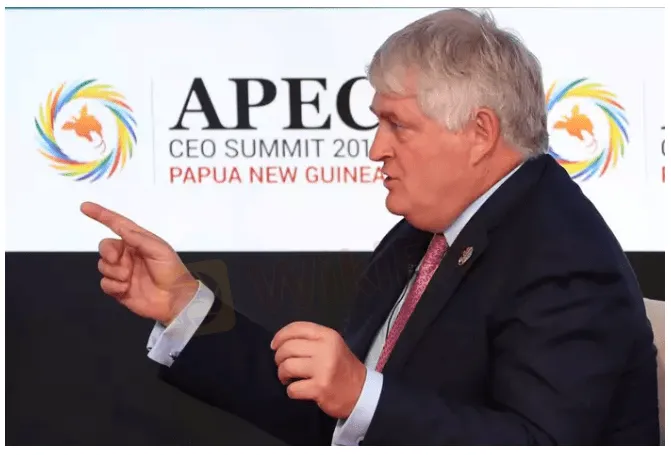简体中文
繁體中文
English
Pусский
日本語
ภาษาไทย
Tiếng Việt
Bahasa Indonesia
Español
हिन्दी
Filippiiniläinen
Français
Deutsch
Português
Türkçe
한국어
العربية
Digicel says ‘discriminatory’ Papua New Guinea tax could impact Australia buyout of Pacific mobile n
Abstract:Digicel Group said it is considering legal options after Papua New Guinea (PNG) imposed a $100 million tax that the telecoms firm said has potential “implications” for the planned A$2.1 billion ($1.57 billion) sale of the Pacific‘s biggest mobile network to Australia’s Telstra.

Telstra Corp Ltd said last October it would buy the Pacific operations of Jamaica-headquartered Digicel in a deal largely funded by the Australian government, seen by observers as a way to block Chinas rising influence in the region. The operations include 2.5 million mobile phone subscribers across PNG, Fiji, Vanuatu, Tonga, Samoa and Nauru.
Digicel‘s Irish founder, Denis O’Brien, met with PNG Prime Minister James Marape last week to try to resolve the matter, Digicel said in a statement emailed to Reuters on Monday.
It said a “new arbitrary, company-specific tax” was introduced on March 25, which was “perplexing not just for Digicel, but also for the Papua New Guinea economy given the reputational and credit rating implications of this sudden, bizarre and unprecedented tax”.
The act imposes a one-time tax liability on Digicel equal to about $100 million with a further penalty of $14 million for non-payment, the statement said.
“This matter requires urgent resolution given its implications for the sale of Digicels Pacific operations to Telstra but also given the knock-on consequences for all foreign direct investment exiting Papua New Guinea,” the statement said.
“Digicel is now engaged in discussions with the Papua New Guinea Government and other relevant stakeholders,” the statement said.
Marapes office did not immediately respond to a request for comment.
A Telstra spokesman said in an emailed statement that the PNG tax was a matter for the current owner of Digicel Pacific. In response to Reuters questions it said it was still awaiting PNG regulatory approvals for the deal.
“The acquisition of Digicel Pacific by Telstra in partnership with the Australian government has not yet received all of its regulatory approvals and has not (been) completed yet,” it said.
The tax was first flagged last November, when Papua New Guinea outlined its 2022 Budget measures. Parliament was told Digicel holds 90% of the retail mobile voice and internet market.
The tax applies only to companies who control more than 40% of PNGs market for telecommunications and banking. Bank of South Pacific, the only other company affected, told the Australian Stock Exchange on Friday the tax came into effect on March 25 and must be paid annually in September.
($1 = 1.3358 Australian dollars)

Disclaimer:
The views in this article only represent the author's personal views, and do not constitute investment advice on this platform. This platform does not guarantee the accuracy, completeness and timeliness of the information in the article, and will not be liable for any loss caused by the use of or reliance on the information in the article.
Read more

Alleged Concerns with TradeEU.global's Trading Practices
An individual trader has come forward with allegations of an unfavourable experience while using the services of the broker TradeEU.global.

Lured by False Promises: Malaysian Driver Lost RM218K to an Investment Scam
A 49-year-old e-hailing driver in Malaysia fell victim to a fraudulent investment scheme, losing RM218,000 in a matter of weeks. The scheme, which falsely promised returns of 3 to 5 per cent within just three days, left the individual financially devastated.

SFC Freezes $91M in Client Accounts Amid Fraud Probe
SFC freezes $91M in client accounts at IBHK, SBI, Monmonkey, and Soochow over suspected hacking and market manipulation during unauthorized online trades.

WikiEXPO Dubai 2024 will take place soon!
2 Days Left!
WikiFX Broker
Latest News
What Makes Cross-Border Payments Easier Than Ever?
Trader Exposes Unethical Practices by STP Trading
Saxo & Portuguese Bank Partnership
SEC Fines Broker-Dealers $275K for Incomplete SAR Filings
Lured by False Promises: Malaysian Driver Lost RM218K to an Investment Scam
FTX Sets March 2025 Timeline for Creditor Payouts: What It Means for Investors
What is an Economic Calendar? How it works
Italian Regulator Warns Against 5 Websites
SFC Freezes $91M in Client Accounts Amid Fraud Probe
Bybit Launches Gold & FX Treasure Hunt with Real Gold Rewards
Currency Calculator


